
The Immigration Reform and Control Act was passed by the 99th United States Congress and signed into law by U.S. President Ronald Reagan on November 6, 1986.
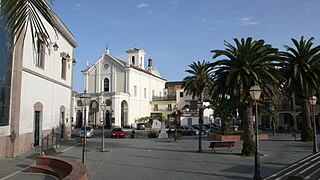
Castel Volturno is a comune (municipality) in the Province of Caserta in the Italian region Campania, located about 35 kilometres (22 mi) northwest of Naples and about 35 kilometres (22 mi) west of Caserta on the Volturno river. In 2010 Castel Volturno was inhabited by 25,000 locals and about 18,000 African refugees. Today (2019) there are still about 25,000 people, estimated two-thirds of them are immigrants.

Illegal immigration is the migration of people into a country in violation of the immigration laws of that country or the continued residence without the legal right to live in that country. Illegal immigration tends to be financially upward, from poorer to richer countries. Illegal residence in another country creates the risk of detention, deportation, and/or other sanctions.
African immigration to the United States refers to immigrants to the United States who are or were nationals of modern African countries. The term African in the scope of this article refers to geographical or national origins rather than racial affiliation. Between the Immigration and Nationality Act of 1965 and 2017, Sub Saharan African-born population in the United States grew to 2.1 million people.
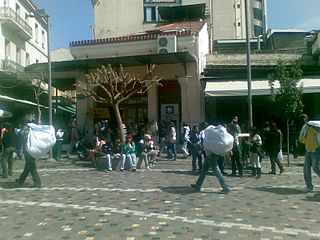
Immigration to Greece percentage of foreign populations in Greece is 7.1% in proportion to the total population of the country. Moreover, between 9 and 11% of the registered Greek labor force of 4.4 million are foreigners. Migrants additionally make up 25% of wage and salary earners.
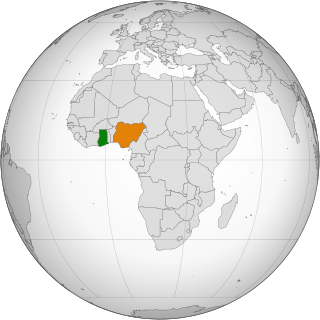
Ghana–Nigeria relations are the bilateral diplomatic relations between Ghana and Nigeria.

The Southern Africa region experiences a relatively high influx of immigration into South Africa. As of 2019, the immigration rate is continuing to increase, and the role of the female population of migrants is significantly growing in this movement and settlement. The majority of immigrants are working residents and influence the presence of several sectors in South Africa. The demographic background of this group is diverse, and the countries of origin mainly belong to Sub-Saharan Africa and push migration south. A portion have qualified as refugees since the 1990s.
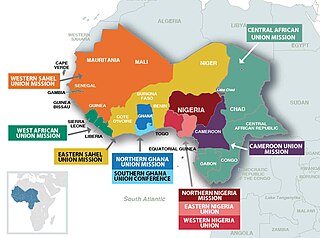
The West-Central Africa Division (WAD) of Seventh-day Adventists is a sub-entity of the General Conference of Seventh-day Adventists, which coordinates the Church's operations in 22 African countries, which include Benin, Burkina Faso, Cameroon, Cape Verde, Central African Republic, Chad, Congo, Equatorial Guinea, Gabon, Gambia, Ghana, Guinea, Guinea-Bissau, Ivory Coast, Liberia, Mali, Mauritania, Niger, Nigeria, Senegal, Sierra Leone, and Togo. Its headquarters is in Abidjan, Côte d'Ivoire. Founded in 2003, the division membership as of June 30, 2021 is 889,196
There are thought to be over half a million undocumented immigrants residing in New York City. They come from many parts of the world, especially Latin America, Asia, Eastern Europe, and the Caribbean. About 70% of them have paid work, in catering, construction, retail, driving, cleaning, and many other trades; at least in catering, their wages tend to be lower than those of comparable workers.
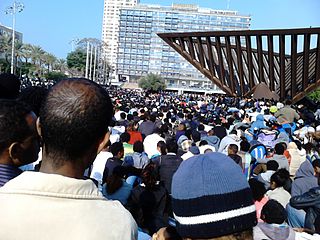
African immigration to Israel is the international movement to Israel from Africa of people that are not natives or do not possess Israeli citizenship in order to settle or reside there. This phenomenon began in the second half of the 2000s, when a large number of people from Africa entered Israel, mainly through the then-lightly fenced border between Israel and Egypt in the Sinai Peninsula. According to the data of the Israeli Interior Ministry, 26,635 people arrived illegally in this way by July 2010, and over 55,000 by January 2012. In an attempt to curb the influx, Israel constructed the Egypt–Israel barrier. Since its completion in December 2013, the barrier has almost completely stopped the immigration of Africans into Israel across the Sinai border.
The Ghana Refugee Board was established under the Ghana Refugee Law 1992, and is charged with the management of activities relating to refugees in Ghana. It is under the control of the Ministry of the Interior.
Immigration to Ghana is managed by the Ghana Immigration Service (GIS). Ghana a country located at the western part of the African continent with a population of 28.83 million and gained independence on 6 March 1957.
Ecobank Kenya is a commercial bank in Kenya. It is one of the commercial banks licensed by the Central Bank of Kenya, the central bank and national banking regulator.

Zongo settlements are areas in West African towns populated mostly by migrants from the northern savannah regions and the West African Sahel, especially from northern Nigeria.

Deportation and removal from the United States occurs when the U.S. government orders a person to leave the country. In fiscal year 2014, Immigration and Customs Enforcement conducted 315,943 removals. Criteria for deportations are set out in 8 U.S.C. § 1227.
The deportation of West African migrants from Nigeria occurred following a January 1983 executive order from President Shehu Shagari, which forced undocumented immigrants to leave the country or face arrest. As a result of Shagari's order, over two million migrants were deported, including one million Ghanaian nationals.
The migration of Ghanaians to Germany started in the early 1950s when a West Germany policy permitted the travel of students from some African countries to Germany to further their education. This policy was to equip the students with knowledge which would be useful in their country of origin when they eventually returned.
Enforcement with consequences is the policy implemented within the US to help deter the rising tide of immigration that has grown in the US. It is the expansion of policy and consequences for people who choose to enter illegally and subjects them to legal, political and educational debates concerning legality status.
The following lists events that happened during 2020 in West Africa.
This is a list of events in 2021 in West Africa.
 Nigeria,
Nigeria,  Benin,
Benin,  Ivory Coast,
Ivory Coast,  Togo, and
Togo, and  Liberia
Liberia  Nigeria,
Nigeria,  Mali,
Mali,  Niger,
Niger,  Benin,
Benin,  Burkina Faso,
Burkina Faso,  Togo,
Togo,  Liberia, and
Liberia, and  Cameroon
Cameroon  Nigeria,
Nigeria,  Ivory Coast, and
Ivory Coast, and  Togo
Togo 








